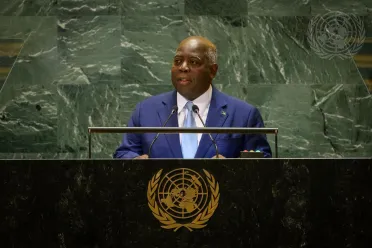Statement
Statement summary
PHILIP DAVIS, Prime Minister of the Bahamas, said that for the past three years — along with other small island developing States — his country has been pleading for Member States to engage in urgent action on climate change. Spotlighting “some welcome progress”, he said that it falls short of what is needed. “At this very moment, the new harsh reality manifests in hurricanes and heat, fire and floods,” he observed, noting that Member States “can somehow quickly find eyewatering sums of money for bullets and bombs” but only “rattle small change in their pockets” when it comes to financing the costs of loss and damage, repair and recovery. While asking nations why they persist in ignoring “the biggest threat of our lives”, he pointed to the lack of determined, committed action and a series of misguided, short-term choices and priorities. “We can choose differently. We can choose better,” he stated. Reporting that his country is a candidate for a non-permanent Security Council membership for 2032-2033, he said that they seek membership because of “the present crisis of today, the looming crisis of tomorrow” and to amplify the voices of small island developing States.
Climate considerations must be integrated into all aspects of the Security Council’s work, he observed, noting that “it’s countries like ours” that will help the organ with inclusive and representative decision-making. Aspirations for global peace and security will remain empty dreams if not supported by economic security. For too long, the global financial system has been skewed against developing nations, he observed, stating that his country has been instrumental in exposing the hypocrisy of unilateral blacklisting. “The present system, with its dark rules and uneven playing field, drains resources from developing countries, leaving us to grapple with the consequences,” he said. Even among small island developing States, the Bahamas is uniquely vulnerable. To that end, the country has created a National Youth Guard to empower young people to become environmental champions. It also embraces innovation in ocean technology to find solutions to the climate crisis.
“The Bahamas may be small in size, but we are not short on ambition or ingenuity,” he emphasized. Reiterating that countries like his contribute very little to the problems of the world, he said that, yet, they are among the most affected. Over 40 per cent of that country’s national debt is a direct result of the impacts of climate change. Urging States to stop thinking about climate change merely as an environmental threat, he underscored that it is a threat multiplier that exacerbated existing tensions. “If we think we have refugee challenges now, do we really want to wait until millions more are forced to cross borders just to survive?” he asked. Further, in 2024, his Government has turned to South-South cooperation to fill the gaps in development support. Stressing that the twenty-ninth UN Climate Change Conference must be a turning point, he encouraged States to revitalize the stalled negotiations on the New Collective Quantified Goal on climate finance.
“Developed nations must step up, not just with words,” he stressed, observing that while global military expenditure soared to an unprecedented $2.4 trillion in 2023, the loss and damage fund, “painstakingly established” at the twenty-eighth UN Climate Change Conference, has secured a mere $800 million in pledges. Calling it a “drop in the ocean”, he underscored that this is not just an issue of funding, but of sustainability and survival. “The loss and damage fund must be fully operationalized,” he stated. He added: “We are not asking for a handout, but for a hand up. Even the strongest swimmer drowns if left alone in a raging sea.” He also renewed his call for the removal of the blockade on Cuba, observing: “It has not worked. It has been in place now for over 70 years. So, why should it still remain?”
Full statement
Read the full statement, in PDF format.
Photo

Previous sessions
Access the statements from previous sessions.
